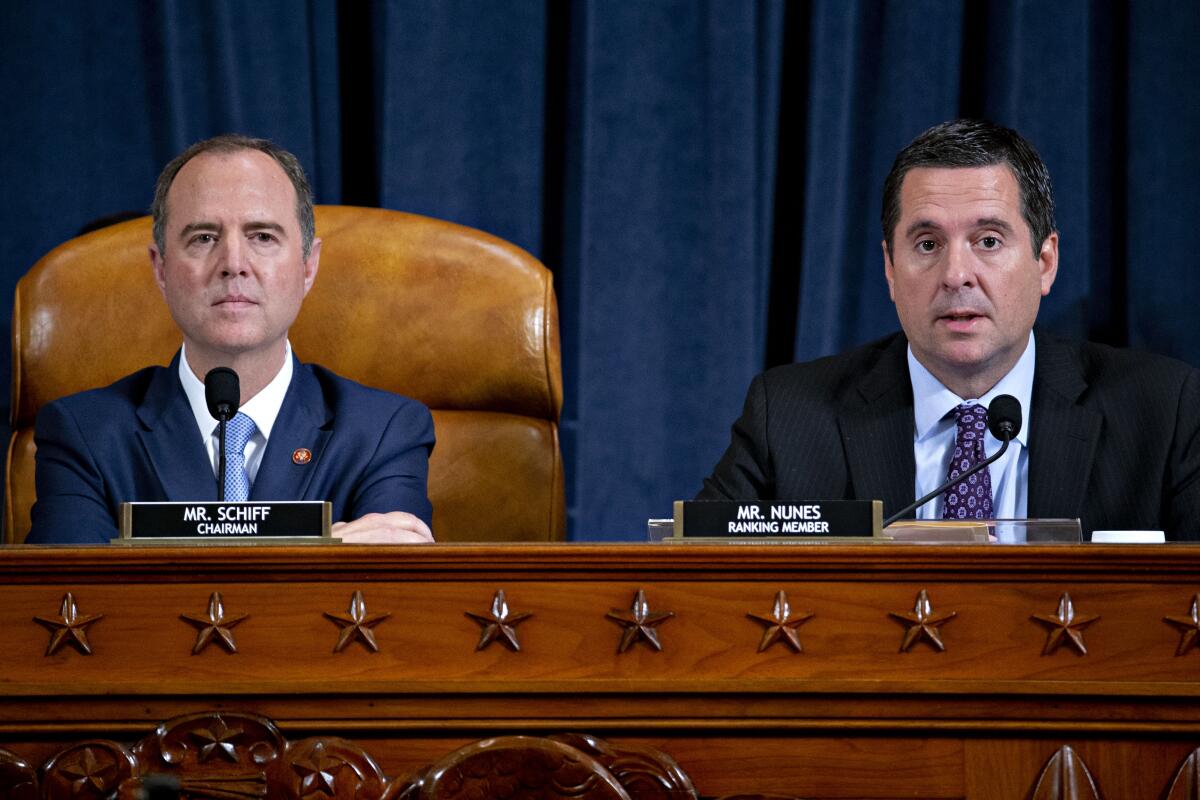The House report makes a compelling case for impeaching Trump

- Share via
It long has been obvious that President Trump abused the power of his office to induce Ukraine — a country desperately in need of U.S. aid — to investigate former Vice President Joe Biden and to lend credence to a conspiracy theory that could be used to challenge the consensus that Russia meddled in the 2016 election to help Trump’s candidacy.
Those damning facts became undeniable with the release of the rough transcript of Trump’s infamous July 25 telephone conversation with Ukrainian President Volodymyr Zelensky, and they were further buttressed in subsequent weeks by a dramatic parade of witnesses before the House Intelligence Committee.
Even so, the 300-page report approved by the Democrats on the Intelligence, Oversight and Foreign Affairs committees on Tuesday weaves what we have learned over the last few months into a compelling narrative with an inescapable conclusion: Trump has compromised and subverted U.S. national security interests for his own domestic political purposes and must be held accountable. It now falls to the House Judiciary Committee to decide whether to respond to Trump’s actions regarding Ukraine, and possibly other derelictions of duty, by drafting articles of impeachment for the full House to consider.
The evidence amassed so far makes a strong argument that in his actions toward Ukraine — which extended far beyond an incriminating telephone call — Trump has committed exactly the sort of “high crimes and misdemeanors” that justify his impeachment, and the advancement of the case to a trial in the Senate. In the Federalist Papers, Alexander Hamilton described an impeachable offense as “the abuse or violation of some public trust.” That aptly describes the conduct described in the report, and only a blind partisan — a characterization that unfortunately applies to most Republicans in Congress — could think otherwise.
The Republicans on the three committees sought to preempt the Democrats’ arguments with a 123-page analysis of their own, casting Trump’s actions as legitimate efforts to test the new Ukrainian government’s commitment to ending corruption. But that report ignored crucial evidence about the nearly successful efforts of Trump’s personal lawyer, former New York City Mayor Rudolph W. Giuliani, to draw Zelensky into announcing investigations that were obviously intended not to fight corruption, but to help Trump’s reelection campaign.
The Democrats’ report makes it clear that the president’s motives were cravenly political; among other things, it cites testimony that Trump was far more concerned with Biden and Biden’s son Hunter than with Burisma, the supposedly corrupt company in question, and that the president never seemed to care whether the investigation was actually undertaken — only that it was publicly announced.
As the report put it, “the president placed his personal political interests above the national interests of the United States, sought to undermine the integrity of the U.S. presidential election process, and endangered U.S. national security.”
The report also documents the “unprecedented” lengths to which the president went to block Congress’ efforts to hold him accountable. It notes that the White House refused to honor subpoenas for relevant documents, directed agencies and present and former officials to not comply with subpoenas and tampered with prospective and actual witnesses.
Despite that campaign, several current and former officials braved the president’s wrath and testified to the multifaceted effort to sabotage a policy of support for Ukraine that Trump theoretically backed. Those witnesses included not only courageous career diplomats and a decorated Army lieutenant colonel assigned to the National Security Council, but also one of Trump’s political appointees, Gordon Sondland, the ambassador to the European Union. It was Sondland who offered some of the most damaging testimony, including his memorable admission that there was a “quid pro quo” that conditioned a coveted White House meeting between Trump and Zelensky on the Ukrainian president’s public announcement of the investigations sought by Trump. Sondland said it required merely a simple “two plus two equals four” calculation to determine that the nearly $400 million in foreign aid to Ukraine was held up for the same reason.
But the fact that some government officials did their duty doesn’t excuse the president’s attempt to deprive the House of testimony to which it was entitled.
As the report notes, among the articles of impeachment approved by the House Judiciary Committee in its investigation of President Nixon was one concluding that he had obstructed justice by withholding evidence. (And even Nixon merely sought to hold back particular pieces of evidence; he didn’t insist on wholesale non-cooperation, as Trump has.)
Now the Judiciary Committee will be examining allegations against Trump, in a process in which the president’s lawyers will rightly have the opportunity to call and cross-examine witnesses and object to the admissibility of some testimony. The report issued Tuesday provides the committee with a significant record about Trump’s actions with respect to Ukraine. The panel also should consider a possible article related to Trump’s efforts to interfere with special counsel Robert S. Mueller III’s investigation of possible ties between the 2016 Trump campaign and Russia.
The Judiciary Committee has a grave responsibility: to decide whether to seek the impeachment of a duly elected president. The bar for impeachment is high. It’s not enough that a president is incompetent — and Trump is spectacularly incompetent — or that he pursues policies that members of Congress find repugnant. The question is whether the president has committed a gross violation of the public trust, a line that can be crossed even if Trump did not violate the criminal law. The report released Tuesday makes a powerful case that he has done exactly that.
More to Read
A cure for the common opinion
Get thought-provoking perspectives with our weekly newsletter.
You may occasionally receive promotional content from the Los Angeles Times.









